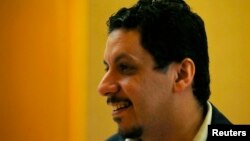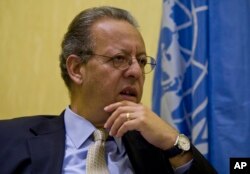The U.N.'s special adviser on Yemen said the release of a top government official held captive by Houthi rebels would help reduce tensions in the country.
Envoy Jamal Benomar met Wednesday with Ahmed bin Mubarak, whose capture 10 days ago sparked fighting between Houthis and government forces, a Houthi siege of the seats of power, and the resignation of the president, the prime minister and his Cabinet.
Benomar is now trying to pick up the pieces, convening a session Wednesday of the Peace and National Partnership Agreement, a process he laid out after the Houthis swept into Sanaa in September to engage the rebel movement in talks with Yemen's other political factions.
While the situation remains fluid, some observers note that despite the power vacuum, prospects for a negotiated settlement remain. Hakim Almasmari, editor of the Yemen Post, said that "the Houthis don't want to control Yemen directly" because "they don't want to take responsibility for a failed state."
But Almasmari said he thought the crisis had strengthened the hand of the northern-based rebels. Speaking on #VOA, he noted that in the three days of violence last week, fewer than 30 people were killed.
"[This] very limited violence shows one thing: The people, the government, the military do not want to fight. They want to reach a solution," he said.
Consensus is goal
Yemen's government, such as it is, agrees that negotiation is key. Mohammed Albasha, spokesman at Yemen's embassy in Washington, argues for consensus building among all of the country's political parties.
"If we don't have a quick solution to the problem, then we're definitely going to be heading toward chaos," he told #VOA.
The potential for chaos has raised fears among Western allies that Yemen-based al-Qaida in the Arabian Peninsula will move to fill the void. Journalist Almasmari argued that those fears were exaggerated.
Noting that Houthi fighters have attacked and killed many AQAP leaders and taken ground once held by the militants, he said the Houthis "are doing basically what the government has not succeeded in doing over the last couple of years."
AQAP is a common enemy for the Houthis and the U.S., which continued its anti-AQAP operations with a drone strike Monday.
That's not to say the Houthis are a natural U.S. ally; their motto is "Death to America. Death to Israel. Victory to Islam." But unlike the Sunni militants of AQAP, the Houthis are Zaidis, a branch of Shiite Islam. While not the defining factor in Houthi-al-Qaida hostilities, some fear recent events could make it so.
Fear of Houthi 'overreach'
Stephen Day, author of "Regionalism and Rebellion in Yemen," told #VOA the Houthi stance risked creating "more religious sectarian division in Yemen, a division that we've seen the horrible consequences of in Iraq and Syria."
While Houthi moves on the capital and against AQAP appear less inspired by sectarianism than by political leverage in domestic politics, Day said he feared that Houthi "overreach" could help al-Qaida draw more recruits.
The same, he said, applies to U.S. drone strikes.
"If anything," Day said, "the drone program has again increased the number of recruits for AQAP. Arguably, the organization has gained strength over the time that [President Barack} Obama has been implementing it."
Embassy spokesman Albasha defended the drone program as "just a component" of the actions taken by Yemen's government and its allies, and noted it remains a question of debate in parliament and elsewhere. He said the larger problem was the vulnerability of Yemen's youth — 60 percent of the population is under age 24 — who live in a country plagued by unemployment, poverty and displacement. Solving those problems, he said, is key to curbing the appeal of AQAP.
But current events aren't helping. As Albasha conceded, the political crisis is derailing any attempt to solve the larger humanitarian and economic ones.


